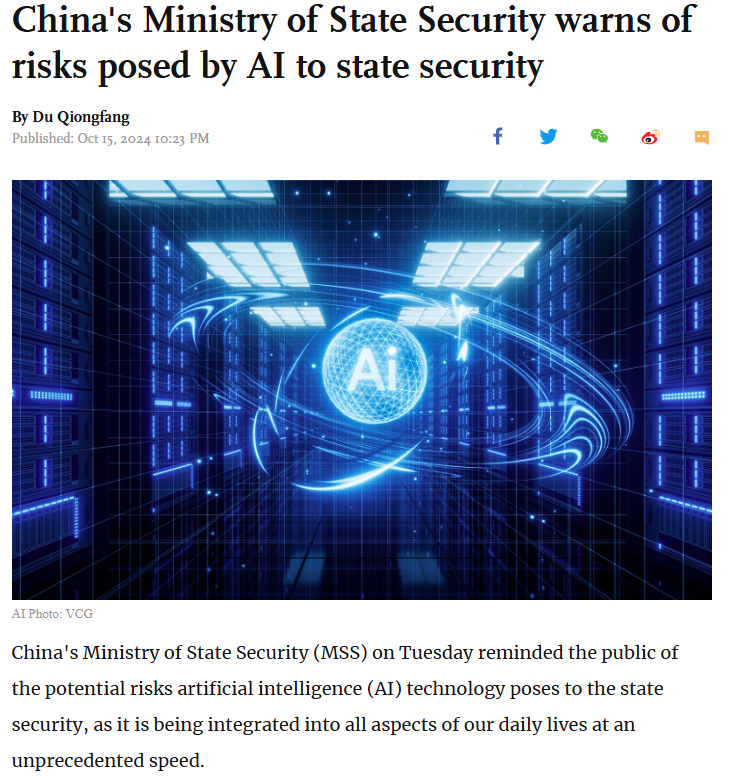LATEST INSIGHTS
Your Present Location: LATEST INSIGHTSLi Wei: China's Ministry of State Security warns of risks posed by AI to state security
Source: Global Times Published: 2024-10-15

By Du Qiongfang
China's Ministry of State Security (MSS) on Tuesday reminded the public of the potential risks artificial intelligence (AI) technology poses to the state security, as it is being integrated into all aspects of our daily lives at an unprecedented speed.
In an article published by the MSS, AI tools can leak sensitive data as AI tools used for generating conversations, texts and other tasks can collect and store personal information, leading to the leakage of private data.
It is even possible for AI tools to infer sensitive information from data related to individuals involved with confidential matters, which could pose risks and cause potential national security hazards if such data are collected or stolen by foreign intelligence agencies.
The MSS also reminded that AI technology can generate and spread false information. As AI technology can quickly generate large amounts of texts, pictures, as well as audio and video content, some criminals can exploit this technology for swindling, fabricating and spreading online rumors or false and harmful information, which could mislead the public and damage both state security and China's image.
Meanwhile, the MSS also reminded that some cyberattacks are linked to smart devices. If smart home devices and intelligent connected vehicles are hacked and their systems are taken control of, hackers can collect and analyze data such as conversations, travel routes and surrounding geographic information through eavesdropping and surveillance, resulting in realistic threats to personal privacy, property security and even state security.
Moreover, the MSS warned that phishing attacks exerted with AI technology are increasingly more covert and sophisticated. Critical industries are vulnerable to becoming victims of deceptive phishing by AI technology. Foreign intelligence agencies have been using AI technology to conduct phishing attacks on China's core secret-related enterprises and institutions with more diverse and complex methods.
Furthermore, the personalized recommendations made by AI technology may conceal information traps, the MSS warned, explaining that through analyzing users' habits, AI recommendation systems can create personalized recommendations that form "filter bubbles" and "echo chambers" that influence individuals' thoughts and beliefs, trapping users in information cocoons. Foreign hostile forces may exploit AI recommendation systems to mislead public opinion and conduct ideological infiltration among Chinese internet users.
As a new stage of the technological development, AI technology involves certain areas that remain unknown to the public. It could be exploited and therefore China must be on high alert, Li Wei, a research fellow and security expert from the China Institutes of Contemporary International Relations, told the Global Times on Tuesday.
Key Words: Li Wei, RDCY, AI, state security























































































 京公网安备 11010802037854号
京公网安备 11010802037854号





